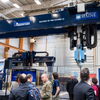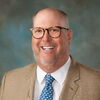On Steve Jobs, disruptive technologies and finding the innovative spirit in Maine
On Jan. 30, 1984, a tall, slender young man in a double-breasted suit stood alone at the corner of Clarendon Street and St. James Avenue, bracing against the cold Boston evening, his eyes trained upwards in awe at a streetlight backlighting the giant snowflakes drifting silently to the Boston streets. Behind him, a crescendo of foot-stomping and cheering grew inside the Old John Hancock Building, the site of the Boston Computer Society's annual meeting.
I was running late, but the sight of Steve Jobs, the meeting's guest of honor, stopped me in my tracks. I had interviewed him before in Apple Computer Inc.'s Cupertino, Calif., office. But this was a moment to observe from a distance, a precious time to watch a man destined for greatness in turn watch the greatness he found in nature. Minutes later, the soon-to-be 29-year-old would apply the same intensity to the matter at hand inside the building: introducing the company's newest computer, the Macintosh, to deafening applause.
The excitement continued through a replay of the now-infamous dystopic, Big Brother commercial that aired during Super Bowl XVIII the week before. Jobs talked about how computer giant IBM Corp. dismissed a series of disruptive technology introductions, including the Digital Equipment Corp. minicomputer in the 1960s and the Apple II personal computer in the 1970s. But once IBM introduced its own personal computer in 1981, Jobs insisted, “IBM wants it all.” He said George Orwell was right about the year 1984 and the dominance of “Big Brother.” But that would change with the new Macintosh, he said, and “you'll see why 1984 won't be like 1984.” A video of his provocative speech is embedded below. It can also be found at: time.com/1847/steve-jobs-mac/.
I didn't recall his profile because of the recent snow or the Super Bowl. I recalled it because of a familiar feeling that resurfaced during a recent meeting at a technology company in Portland. While reminiscing with the company's executives about some of the great innovators of the past, including Jobs, I sensed an energy and excitement that I hadn't felt since my early days of reporting on the computer industry. It was a feeling that something game-changing could be invented and developed right here in Maine. It was seeing the kind of innovative spirit that comes from an entrepreneur loving what he or she does, and letting boundaries blur between work and the rest of life.
The company, newcomer FieldStack, makes software and systems that can help retailers improve their product flow, productivity and profits. The software was developed by Bull Moose founder Brett Wickard, who also started FieldStack's predecessor company 10 years ago, and tested the product at Bull Moose shops before starting to sell it to other retailers.
Wickard, a Bowdoin College graduate who started the first Bull Moose store in Brunswick, realized he had something when one of his distributors said, “you have a secret.” Wickard swore he didn't, but the distributor went on to say that Bull Moose stood out in the inventory metrics it saw across all customers. While other customers had product returns of 14% to 20%, Wickard said, Bull Moose was in the low single digits.
The difference, said Wickard, a self-proclaimed “math geek,” was that he figured out a way to parse data about what his customers bought or returned, then tried to never be out of desired items.
“We used our used goods to infer demand for new goods,” he told me during our interview.
To Wickard, as is true of many innovators, his vocation is a way of life. He works through differential equations in his head while on the treadmill. His face lights up just talking about math and data and using them to improve retail results. And then there's Maine.
“Maine has an opportunity to push way forward on technology,” said Wickard, a transplant who recognizes Maine's people as a great asset. “The battle is won one person at a time.”










Comments